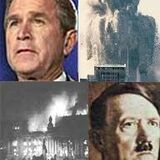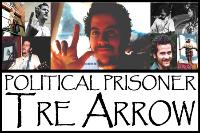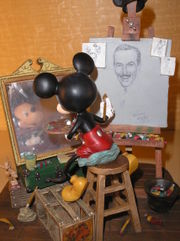Monday, February 12
Decider-in-Chief Decided to Sacrifice Libby*?
As reported by the Associated Press:
"What didn't he touch? It's almost like there was almost nothing too trivial for the vice president to handle," said New York University professor Paul Light, an expert in the bureaucracy of the executive branch.
"The details suggest Cheney was almost a deputy president with a shadow operation. He had his own source of advice. He had his own source of access. He was making his own decisions," Light said.But last week* Libby's defense implicated George Bush in the cover-up through a note Cheney wrote to an aide.
Truthdig.com published Wednesday (7 February) a startling piece of commentary by New York Observer staff writer Joe Conason on the startling revelation. Below is the money quote from "Role of the Big Guys Is Becoming Clear in Plame Case":
.... Where does that leave the president and the vice president? Over the past several days, the outlines of Cheney’s role in the nasty attack on the Wilsons and the subsequent cover-up have become increasingly plain. He not only oversaw the activities of Libby, his chief of staff, but went so far as to order McClellan to “clear” Libby in a press briefing.
That incident came up during the testimony of David Addington, who now holds Libby’s old job as vice presidential chief of staff and was formerly counsel to the vice president. The defense brought into evidence a note written by Cheney himself explaining why he insisted that the White House press staff defend Libby just as vigorously as Rove.
The angry note said, “Not going to protect one staffer [plus] sacrifice the guy this Pres. asked to stick his head in the meat grinder because of the incompetence of others.” Although Cheney had crossed out the words “this Pres.” and replaced them with the phrase “that was,” the reference to Bush remains perfectly legible—and deeply incriminating.
But from the loud silence in the mainstream media, you couldn't know the Decider-in-Chief had been so completely implicated in the cover-up.What will Special Prosecutor Patrick Fitzgerald do with that piece of information? Will the White House's prosecution-proof armor hold out one more time for this band of criminals?
Inquiring minds are waiting to know.
Postscript: The day after Conason's Truthdig.com piece appeared, NPR's Diane Rehm interviewed three reporters from Newsweek, Slate and the National Review about revelations emerging from the Libby trail. Ignoring the note produced by Libby's defense, the three instead launched into a protracted "he said but then he said, then he said again" exchange. After one commericial break, Rehm offhandedly noted to her listeners that the threads of the case presented by her guests were "very complex." Great understatement, Diane.
*14 February Update: Writing for Truthout.org, Jason Leopold and Marc Ash scooped Conason a week earlier on Cheney's note implicating Bush: "Cheney's Handwritten Notes Implicate Bush in Plame Affair," 31 January 2007:
"But Cheney's notes, which were introduced into evidence Tuesday [30 January] during Libby's perjury and obstruction-of-justice trial, call into question the truthfulness of President Bush's vehement denials about his prior knowledge of the attacks against
Oddly, Leopold and Ash reveal it was the prosecution--not Libby's defense--that introduced this startling evidence. What's going on here? Why hasn't Fitzgerald subpoenaed Bush?
The authors provide copies of Cheney's notes they claim implicate Bush.











